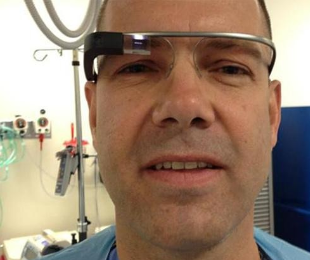
I grew up in a medical household, and two of my siblings have followed my parents into the healthcare professions. They’re all doing important, life-saving work. My decision to study history, and then focus on culture and technology, did not follow the established script. But my family may be happy to know that what I’m interested in – AR – may have something to add to healthcare.
Many physicians and surgeons use endoscopic cameras (inside the patient), especially in laparoscopic procedures, and the video recordings that result can be used to teach other doctors (as well as entertain their patients-if anyone wants to see the inside of my now rebuilt left shoulder, I’ve got a 60-minute movie for you). Recently Dr. Rafael Grossmann added another perspective-that of a surgeon using Google Glass in his blog post “OK Glass: Hand Me the Scalpel Please…”
Dr. Grossman believes wearables could find a permanent place in surgery because they allow for “better intra-operative consultations, surgical mentoring and potentiate remote medical education, in a very simple way.” He wore Google Glass for a recent surgical procedure with a Google Hangouts active. The live video images that he saw through Glass were projected to a nearby iPad screen.
Recently, an emergency room physician told us he was able to save a life using a technique he’d learned at a conference only a few days before. It struck us that by using a combination of AR and wearables a physician might have the resources, beyond his memory, to identify an appropriate life saving procedure at all times. And specialists in certain procedures could be used to guide general surgeons in sophisticated, rare surgical procedures.
We don’t yet know whether Google Glass will take hold in everyday life-they may simply be too geeky. But in a variety or domains and places they make perfect sense. Surgery could be one.
– Kevin
